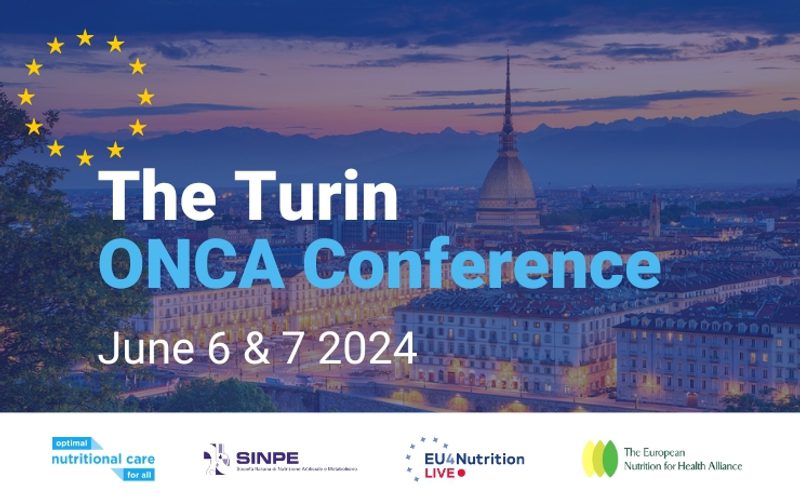
Posted on: June 18, 2024
Launched 10 years ago, the Optimal Nutritional Care for All (ONCA) campaign is a multi-stakeholder initiative to facilitate greater screening for risk of disease-related malnutrition/undernutrition and nutritional care implementation across Europe.
The 2024 ONCA Conference took place on 6 & 7 June in the city of Turin, Italy, bringing together healthcare professionals, patients, policy makers and industry representatives. This year the conference was positioned as a nutritional care policy summit, bridging the gap between nutritional science and effective policies.
The focus of the conference was ‘Malnutrition: from Awareness towards Control’, as more than 30 million people across Europe are affected by malnutrition.[1] Despite there being an array of scientific evidence, malnutrition is still often underdiagnosed and undertreated, causing unacceptable inequalities between people and countries. The ONCA campaign shares insights and learnings from countries in order to do better.
The conference on 6 June took place in the magnificent Teatro Regio, the Royal Theatre of Turin. It began with a patient session, highlighting the importance of patient advocacy and empowering the patient voice as experts in their different conditions. Engaging with decision makers who have a personal connection to enteral or parenteral nutrition can also really help push nutrition up the agenda.
The morning session focused on ‘Nutritional Care: How do we get from awareness to control?’ with talks including ‘Setting the scene: Implementing Nutritional Care for Optimal Health’, ‘Empowering Health Through Nutritional Care: A Patient-Centric Journey of Progress’ which focused on cancer patients and ‘Getting to Grip on Nutritional Care at a National Level’. Francesco Branca, Director, Department of Nutrition and Food Safety, World Health Organisation (WHO) also sharing global insights into disease-related malnutrition.
At the end of the session the take home message was that there needs to be coherent messages from stakeholders and health economic data provided to really make decision makers listen and act.
The afternoon session included talks from EFAD and the ESPEN President, Rocco Barazzoni, who is raising the profile of disease-related malnutrition, particularly to the (WHO and is pushing for an ICD code to address disease-related malnutrition specifically. This was followed by a session focusing on parenteral nutrition, titled ’Uniting IF patients' voices - Are we ready to accept the challenge?’. This was a very inspiring session from Sergio Settanni whose 15-year-old daughter is on parenteral nutrition, and Marek Lichota who founded ‘Appetite for Life’ and is also a parenteral nutrition user, discussing their work to engage, empower and educate on behalf of intestinal failure (IF) and home artificial nutrition (HAN) patients.
Simon Lal, Professor of Gastroenterology and Lead at Salford National Reference Intestinal Failure Centre discussed ‘Navigating Nutritional Policies in the UK: Valuable Lessons from Intestinal Failure Strategies’, stating that intestinal failure is the forgotten organ failure in many countries, with home parenteral nutrition (HPN) not always being available. In the UK all patents have access to HPN who need it and the aim is that all European IF patients will receive equal standard of care by 2030.
Day 2 took place in the beautiful conference rooms of the NH Centro Hotel, where the session began with talks addressing the Italian plan of attack for optimal nutrition in 2024 and looking at the impact of nutritional support within their hospital admissions, with screening and intervention being key to achieving success.
Breakout sessions followed, including ‘Empowering Health through Knowledge: Implementing successful nutrition education’, ‘Enabling Patient Engagement: The essential driver for advancing nutritional policies’, ‘Economic Foundations: Steering Nutritional Care Policies Towards Health’, ‘Optimizing Malnutrition Awareness Week: Fostering Good Practices for Collective Success’ and ‘Intestinal Failure and Nutrition: Unmet Needs that Resonate with Policymakers.’
The take-away messages from the ONCA Conference are to join forces to ensure all patients receive the nutritional care they need and that nutrition is seen as part of the holistic approach to patient care. To do this we need:
- Collaboration with key stakeholders: working together to raise awareness of the importance of disease-related malnutrition
- Patient-centred care: prioritising patients and empowering patients to be advocates, focusing on the patient and not just the disease
- Shared learning: to instigate changes to policy to ensure equity of provision in the future for everyone who needs nutrition support.
[1] Ljungqvist O, de Man F. Under nutrition - a major health problem in Europe. Nutr Hosp 2009; 24(3): 368-70.